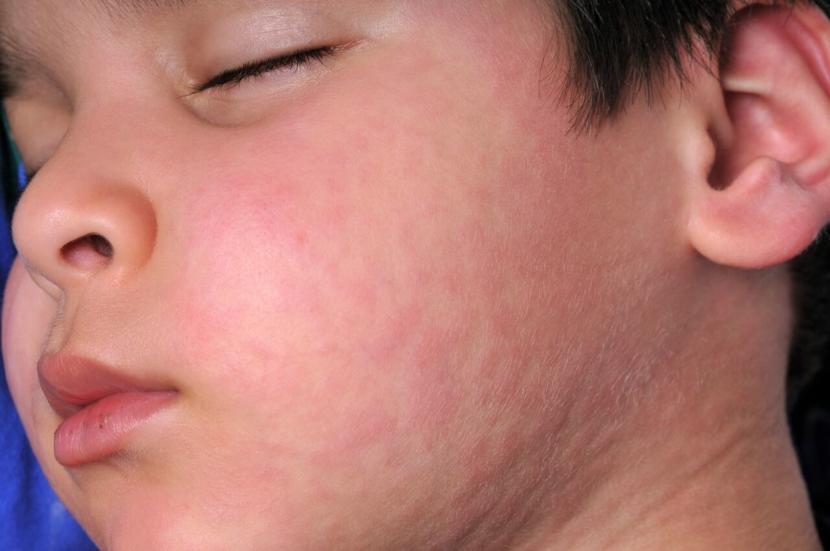What Is Rubella?
mm
Rubella, commonly known as German measles, is a contagious viral infection that develops in both children and young adults.

Commonly known as German measles, Rubella is an infection caused by a virus and its symptoms include red rashes on the body along-with fever, headache, muscle pain, a runny nose. Sometimes, swollen nymph nodes can also be seen. It is a contagious infection and can spread from one person to another through contact, when the infected person sneezes or coughs.
The rubella vaccine was introduced in the late 1960s and since then, the cases of German measles have considerably lessened. However, in some parts of the world, this infection is still common. It generally affects children, especially those between 5 and 9 years old, but it can also occur in adults.
However, in pregnant women, it could lead to a serious ailment called congenital rubella syndrome in the fetus. Congenital rubella syndrome could hamper the baby’s development and lead to severe birth defects, such as heart abnormalities, deafness, and brain damage.
Symptoms
Most of the times, the symptoms of rubella are very mild and not that easily noticeable. Symptoms generally appear in a span of two to three weeks post the body’s initial contact with the virus and often last for about three to seven days.
Symptoms may include:
- Pink or red rash that begins on the face, spreading downward to the rest of the body
- Mild fever
- Swollen and tender lymph nodes
- Runny or stuffy nose
- Headache
- Muscle pain
- Inflamed or red eyes
In rare cases, German measles could result in ear infections and swelling of the brain.
Call your doctor right away, if you notice any of the following symptoms:
- Prolonged headache
- Ear ache
- Stiff neck
Causes
German measles is caused by a highly contagious virus, the rubella virus from which it derives its name, which spreads through close contact or through the air. It can also be passed on from a expecting mother to her growing baby through the bloodstream.
People who have contracted German measles are most contagious almost a week before the rash appears till about two weeks after the rash starts fading away. So they can unknowingly transmit the rubella virus even before they are aware that they are infected.
Diagnosis
As German measles appears just like some other viruses that cause rashes, your physician may ask you to do a blood test to confirm your diagnosis.
Prevention
A safe and successful method to prevent rubella is vaccination. This vaccine is normally given in combination with the vaccines for measles, mumps as well as varicella, the virus that causes chicken pox. They are usually administered to children between 12 and 15 months and a booster shot should be given again when children are between ages 4 and 6.
Natural Remedies
Some ways to soothe fever and pain in the joints while your child is down with rubella are:
- Lime blossom and peppermint tea - If you give a half of glass of this remedy to your child 3 times a day, you will make him/her feel much better as these two components make your child sweat, and urinate more frequently, soothe the fever and make him/her more lively and enhances appetite.
- All berries (raspberries, blackberries, strawberries) - They are full of vitamin C, which is a great warrior in the struggle with various bugs. Give fresh berries to your ill kid once a day. Guilder berry (Virburnum) is very useful in virus infections accompanied with fever. It has a very specific taste, but together with honey or a little bit of sugar, it is very pleasant and palatable. A guilder berry mixture is usually made with sugar 1:1 and kept it in a cold place. If you give a teaspoon of the remedy to your child with fever 3 times a day, you will see the effect after consuming this remedy 3-4 times: fever goes down, appetite comes back.
- Chamomile and pine cones - These two together work perfectly well, while coping with rash. It calms down the pain in the joints when some decoction from them is added to a bath or used in compresses.
These remedies help to boost the body’s resistance to the virus and prevent further complications of rubella.
Another easily accessible and cost effective remedy is Elecampane. Elecampane is a well- known herb all over the world, with immune stimulating properties and has been used since ancient times in folk medicine. If you make some tea from 1 teaspoon of the dry herb and 200 ml of boiling water, and give it to your ill little one, you might notice the effect after 24 hours. All symptoms of flu in your kid will start fading away; the general condition will improve obviously, as the main healing attribute of elecampane is the stimulation of the bone marrow, which leads to the intensive production of the bugs fighters- leukocytes and lessens the general intoxication in the body of your baby.
A few words about the guilder rose (Viburnum opulus) again, the fruits of this plant contain 70% more vitamin C than in lemons, also 1 tablespoon of Viburnum berries provides the daily human need for vitamin C. Therefore, it is advisable to freeze 1 - 2 kg of Viburnum in the freezer and use it, from early spring as the means of virus diseases prevention. Viburnum is an irreplaceable remedy while fighting the rubella virus, due to the high content of vitamin C and useful minerals (manganese, zinc, iron, phosphorus, copper, chromium, iodine, selenium) which enhance the body immunity system.
If you have rubella, you should:
- Stay off work for six to seven days from the start of the rash.
- Keep your child off school for six to seven days from the start of their rash.
- Avoid any contact with pregnant women for at least a week after the start of the rash.
Dietary Requirements
- Fresh fruit and vegetables are indispensable in the daily diet of a child infected with any virus, particularly rubella. They are full of antioxidants, which help to clean up the body from the “waste products”.
- Provide your child with hypo allergic foods, free of dyes and flavor additives and sugar and avoid junk food.
- Use light healthy oil while cooking for your little one, olive oil, for example.
- Give your baby plenty of water, do not let your baby get dehydrated, as it might cause a lot of troubles (unrest, stomachache, headache).
- Do not force your child to eat, as there is a reason behind his or her unwillingness to have something to eat. When viruses attack your baby`s body, they produce some toxins which poison them (causing intoxication), that`s why children have poor appetites or even lose it completely.
- Exclude all sweet fizzy drinks and caffeinated beverages from your child`s nutrition.
- Make simple fat free, low in carbohydrate meals for your loved ones, which would unload their digestive system while fighting the illness.
Treatment
Mostly, if your child is down with rubella, he/she will be treated at home and prescribed rest and mild medication to provide relief from fever and aches. The doctor may also suggest that you or your child do not attend work or school for a few days to minimize the chances of transmitting the virus to others. Expecting mothers may be treated with antibodies that can fight off the virus.
















